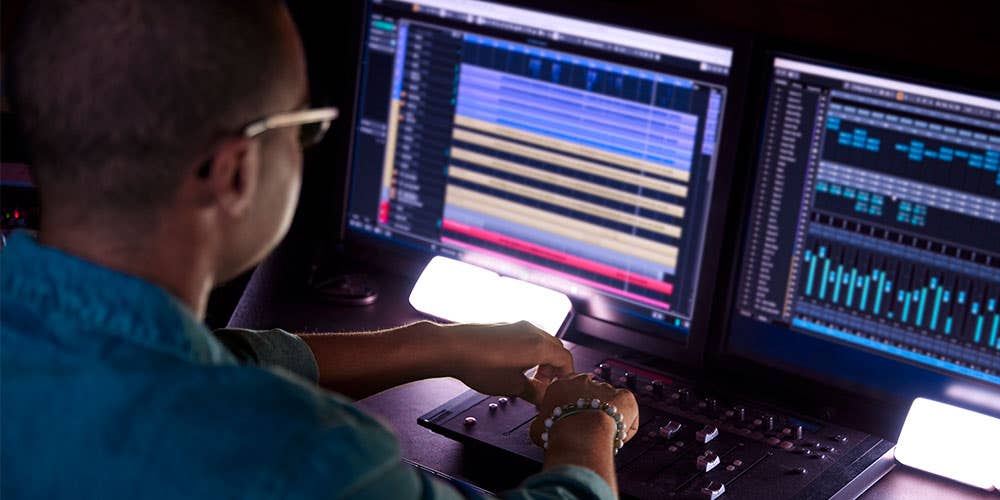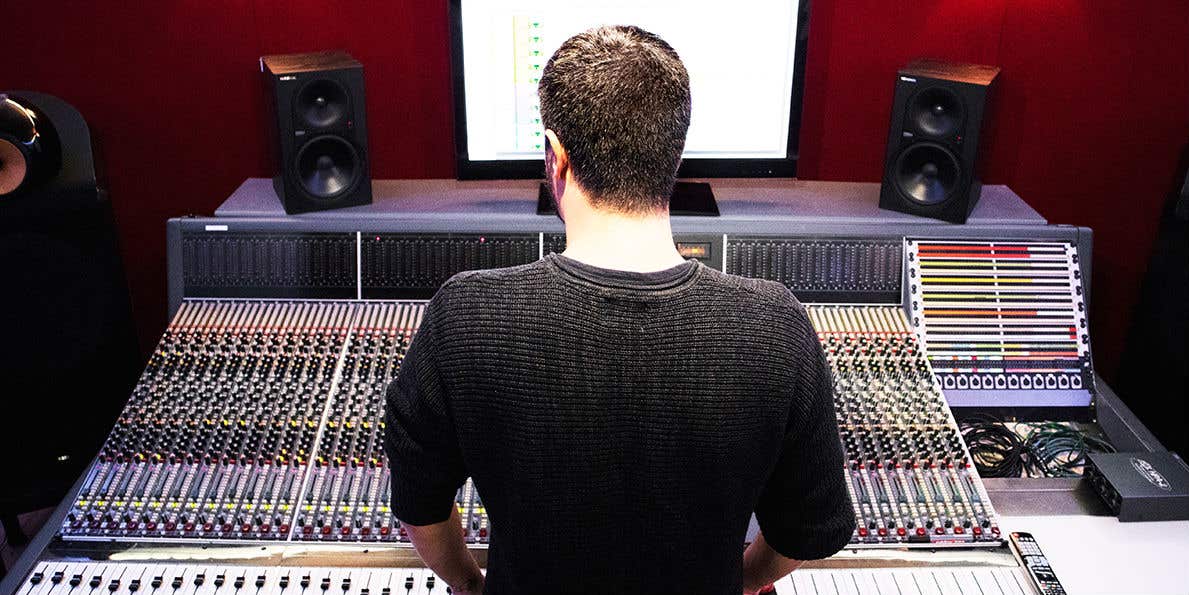Chatea con Ava - Tu consultor de negocios IA
¡Hola, soy Ava, tu guía de IA para potenciar tu negocio!
Ya sea que dirijas una empresa o sueñes con iniciar una, estoy aquí para hacer realidad tu visión gracias a los freelancers que usan IA. Comparte los objetivos de tu negocio y juntos crearemos un proyecto en los que nuestros talentosos freelancers puedan ofertar. ¡Hagamos realidad tu visión!
Tengo un negocio
Estoy comenzando un negocio
Algo salió mal al enviar la conversación a tu correo electrónico. Por favor, intenta de nuevo más tarde.
Solo puedes guardar tu conversación una vez por hora. Por favor, intenta de nuevo más tarde.
Tu conversación es demasiado corta. Sigue chateando con Ava para poder guardar.
Why hiring a musician will make your content sing
Resonate with a wider audience by adding a musician to your team
28 ene 2021 • Lectura de 7 minutos
Actualizado el 2 feb 2021 por Closed User
F
Closed User
Falló el copiado al portapapeles. Intenta de nuevo después de ajustar tus permisos.
Copiado al portapapeles.

Many businesses across all industries need to commission a snippet or more of music sooner or later -- whether it’s a one-time jingle or an ongoing series of video game soundtracks. Luckily, there are thousands of freelance musicians who can help fill in your project’s missing notes.
In today’s digital world, clients can connect with thousands of freelancers across the globe. So, freelance musicians can shed the word “starving” from “starving artist” and help you create a perfectly catchy jingle or instantly memorable podcast intro.
What is a freelance musician?
Freelance musicians can take many forms. Some simply play and perform music like singing or playing an instrument. Others write music, from simple marketing jingles to complex video game soundtracks. Others tweak and fine-tune music, for instance producing and remixing an album.
As freelancers, they do this on an ad-hoc basis for a mix of clients. They may do this full-time or part-time alongside another career, either as a musician or something else.
Since there are more musicians than professional musical careers, many musicians are flocking to the freelance way of life to do what they love, and of course, to pay the bills.
This article will describe the different types of musicians out there, what they can do for you and how you can work with them effectively.
What freelance musicians can do for you
Depending on their speciality, musicians can write, record, perform, transcribe, sing, compose and even teach music. Many artists are flexible and versatile, offering many services to their clients, including:
Recording a pre-composed segment of music as part of a larger recording session
Temporarily filling in as a non-permanent member of a band for live performances
Offering singing or instrument lessons
Writing and composing the music and/or words to a jingle or song
Transcribing a musical piece that had never before been transcribed, like a live jazz performance or a tribal folk song
Managing the entire recording process, including hiring musicians, overseeing the recordings and polishing the final output
Engineering a pre-existing musical recording to make it sound better
Adding sound effects into an existing musical piece
Are there different types of freelance musicians?
A freelance musician is, first and foremost, a musician. Many enjoy the variety of freelance work because they are meeting new people, experiencing different audiences, and getting more gigs.
Session musicians

A session musician plays during a session in the studio, on stage, or remotely - usually as a backing vocalist or instrumentalist. This type of freelance musician specializes in working alongside other musicians.
Freelance session musicians don’t have a permanent position but can play for extended periods with the same group. They often work regularly but with several performers.
Some freelancers can make a comfortable living out of being a session musician. For example, an elite saxophonist could receive many invitations to attend recording sessions for all manner of clients -- from musical composers to jazz ensembles to R&B recording artists.
Music producers

If you’re working on a complex project like an album, soundtrack, movie short or jingle, a music producer helps you oversee the entire project and ultimately bring your vision to life. For projects like these, a producer is indispensable and can perform the following tasks:
Work with you closely to understand your vision
Hire all the writers, musicians and sound engineers necessary to compose and perform the music
Rent a recording studio and oversee the recording sessions
Add their own instrumentation or creative flair (such as adding samples or remixing the sound)
Polish the final output
Ensure the project stays on schedule and on budget
Freelancer.com has thousands of professional freelance music producers who can help take your next music project to the next level.
Sound engineers

A sound engineer helps optimise the sound quality during a recording or live performance by balancing and adjusting the sound. Using equalization and audio effects like mixing, reproduction, and sound reinforcement, audio engineers can work alone or under the guidance of a producer.
A freelance audio engineer can work on recording sessions, festivals, performances, conventions, corporate events, tournaments, contests, and more.
Music transcribers

Freelance music transcribers create sheet music with their keen hearing, expertise in music notation and the help of specialized computer software. Most trained musicians can do basic music transcription, but you’ll want a transcription expert if you need detailed scores, guitar tablature or lead sheets from just a recording.
Freelance music transcribers are frequently hired by amateur musicians, academic institutions, and performance groups. Transcribers work almost exclusively freelance, so your transcriber may offer several other music-related services described in this article.
Freelance music teachers

With the latest technology, music teachers can offer virtual lessons services worldwide. They may also perform other freelance music work like session work or transcriptions.
What to look for in a freelance musician’s portfolio?
The first thing a reputable freelance musician should have is a public portfolio, easily discoverable online. A good portfolio will be well-organized, easy to navigate and contain information about:
Where they studied
Projects they’ve worked on
Awards they’ve won
Links to real-life examples of music they’ve written, performed, engineered or produced
Client testimonials
Their particular skills, such as what instruments they play, what styles they’re proficient in and where their interests and passions lie
How much is a freelance musician’s salary?
Many freelance musicians will charge by the hour, and can charge anywhere from $15 to $500 an hour based on the freelance musician’s portfolio, expected contribution and skill level. In some countries, the salary is a lot lower.
They may vary their baseline rate based on considerations such as travel, whether the session takes place after hours, the complexity of the music and seasonal demand. Up-and-coming musicians might take gigs for less so they can have more experience to add to their portfolio.
For small projects, you should be able to hire a competent freelance musician, engineer, or producer in the range of $25-$60 per hour.
How to select a freelance musician
The key to any contract is open communication. These steps will make it more likely your agreement works out well:
1. Decide what kind of musician you need
Based on the describptions above, do you need a composer to write and record a simple jingle? Or do you need the project management expertise of a producer? Or something else?
2. Consider Several Freelance Musicians
Research different freelance musicians as options and create a shortlist of those whose portfolios match your project requirements best.
3. Create a Detailed Brief
Your brief will vary based on what type of musician you’ll be hiring, but here are some considerations you’ll want to include based on the type of project:
Your vision for the end product
The budget
Production deadlines
For longer sessions or live performances: sleeping arrangements, per diems, rehearsal dates and show dates
Songs they’ll need to learn (many prefer streaming in Soundcloud or Dropbox so they can listen whenever and however they want).
Gear they should bring
What to wear if it’s a live show or video recording
What audio software you use or would prefer they use
4. Ask for Several Bids and Proposals
Send the brief to a few freelance musicians and ask them to describe how they can complete the work, how much time they need and the cost.
5. Review the Submissions
When you use the Freelancer.com platform, you will likely receive many proposal submissions. The best proposals convey that the freelancer understands the project, offers relevant solutions, and stays within your budget. Make another review of their resume and portfolio.
After making a final choice, draw up a contract that describes the details you’ve agreed on, and make sure to describe what happens if particular conditions aren’t met. For example:
How does the hourly rate change if you decide you want the project extended or if you request the freelance musician work overtime or late at night?
What happens if the project ends up running over budget through no fault of the freelancer?
How many revisions are included in the contract?
What happens if you change your mind about the project details at any point?
Ultimately, this is your project, and you are the leader. Let everyone know their part, so you can all work together to make your project sing!
Audio Software Options
Freelance musicians tend to be more flexible than other musicians, so they may work with more than one piece of audio software. Make sure your detailed brief outlines any restrictions you have for software and check that the freelance musicians can accommodate your choice. Here are three common software options, but there are many others.
Logic Pro X
As an Apple product, Logic Pro X allows you to control music-making sessions from an iPad or iPhone using Logic Remote. Ideal for spontaneous composition, this is a dynamic way to create and arrange music in real time.
It allows you to add loops, samples or recorded performances into a grid and then rearrange or overlap as necessary.
This extremely popular software is beginner-friendly and is great for producing, composing, and mixing music.
Audacity
A group of volunteers developed Audacity as a free, open-source, cross-platform audio solution. Easy-to-use, this multi-track audio recorder and editor works for Windows, macOS, GNU/Linux and others.
Audacity records live audio using a mixer or a microphone, or you can add digitized recordings from other media. You can import, combine, and edit your sound files in Audacity, then export recordings in different file formats, even multiple files at one time.
Editing is easy with Cut, Copy, Paste and Delete, Undo and Redo functionality - allowing you or your musician to manipulate the tracks and selections with an extensive range of keyboard shortcuts.
Sibelius
Sibelius offers music notation software designed for everyone. For simple scores, you can use the free version of Sibelius. Great for small ensembles, Sibelius lets you write music for up to 16 instruments.
Sibelius is always adding new features, making it the most popular digital audio tool for composers, copyists, arrangers, and engravers.
Sibelius drives your composing process while making sure that the musical score remains accurate and legible. Then, Sibelius helps your project shine with an intuitive task-oriented interface and a professional sound library.
Sibelius offers Cloud Sharing so that you can share scores online with all of the freelance musicians on your team. Or post your finished works on social media so anyone can play your composition anywhere, on any device.
Bottom Line
Before the digital age, finding the right musician was a challenge due to geographic and technological restrictions. But these days, you can find freelance musicians who can play any instrument you want, and others who can perfect your projects from wherever they are in the world – and send it to you instantly.
Historias relacionadas
Habla con uno de nuestros Copilotos técnicos para que te ayude con tu proyecto
Artículos recomendados solo para ti

Think of an iconic brand and it's likely you can associate them with a piece of music. A jingle can help your business stick in customers' minds
8 min read

Sound engineer Mauro S got to merge his professional passion with a personal one
2 min read

For large musical projects, you need a professional who can see it through from beginning to end.
5 min read

A sound engineer will help your project hit just the right note.
6 min read
¡Gracias! Te hemos enviado un enlace para reclamar tu crédito gratuito.
Algo salió mal al enviar tu correo electrónico. Por favor, intenta de nuevo.
Cargando visualización previa
Permiso concedido para Geolocalización.
Tu sesión de acceso ha expirado y has sido desconectado. Por favor, inica sesión nuevamente.






















